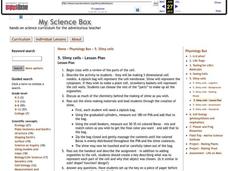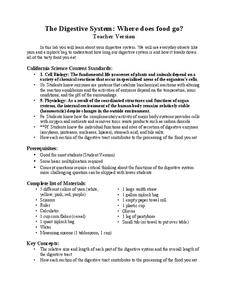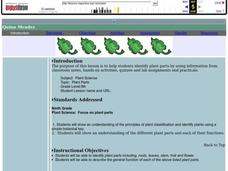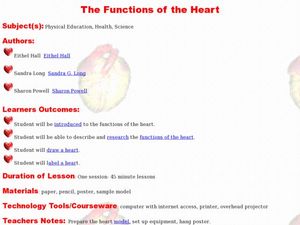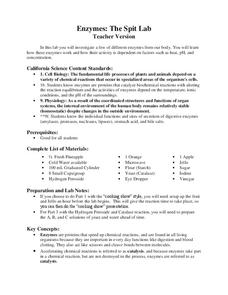Curated OER
The Giant Cell
After actively participating in a unit on cells, the students act out and become the organelles. They will act out and explain the functions of what each of the organelles do for the cell.
Curated OER
Slimy cells
Students study the parts of a cell. In this chemistry instructional activity students complete an activity in which they make as much slime as they want.
Curated OER
Study of the Cell
Students draw a diagram to show the fluid mosaic model of a membrane. They explain how hydrophobic and hydrophilic properties help membranes hold their shape. They identify the functions of different cell membrane proteins as well.
Curated OER
The Journey of a Red Blood Cell
Fifth graders examine how a red blood cell travels throughout the body. Using a model, they follow the flow of blood throughout the entire body. They identify the functions of the lungs and discuss the difference of the blood entering...
LABScI
The Digestive System: Where Does Food Go?
Would you believe that your digestive system stretches to five times your height?! Help your pupils to understand this relationship as they work through the laboratory exercise. The first instructional activity of a 12-part series is a...
National Nanotechnology Infrastructure Network
Save the Dinosaurs with Copper and Zinc!
Create a coat of armor for dinosaur volunteers. Young scientists explore the oxidation-reduction reaction facilitated by electric current. The result of the reaction is a dinosaur coated in copper and zinc, which leads to an...
Curated OER
Plasmolysis in Elodea Plant Cells
High schoolers microscopically observe various subcellular components. They determine the effects of different salt solutions on Elodea plant cells. Students explain the major function of a cell membrane and describe its structure.
Curated OER
Prokaryotes and Eukaryotes
Students study prokaryotes and eukaryotes and compare and contrast them. They review the parts of the cell and define th eterms prokaryotes and eukaryotes. In pairs, they identify the organelles in a prokaryotic cell and a eukaryotic...
Curated OER
Plant Parts
Ninth graders identify plant parts by using different classification methods. In this plant lesson plan students observe and draw different types of leaves then classify them according to species.
Curated OER
The Functions of the Heart
Students explore the function of the human heart. In this heart anatomy lesson, students participate in activities offered at an Internet website to discover the characteristics and jobs of the parts of the human heart.
Curated OER
Science Lessons
Tenth graders research about the different cell organelles. For this series of biology lessons, 10th graders compare two allotropes of carbon. They investigate how the rate of reaction is affected by concentration.
Curated OER
Whst Makes You Tick?
Eleventh graders explore the major organs of the circulatory system. In this circulatory system lesson, 11th graders create, identify and describe parts of the system. Students view a list of major organs and predict what their job is....
Curated OER
What is a Seed?
First graders identify the parts of a seed. In this plant biology instructional activity, 1st graders are given a seed and identify each part of the seed by using a hand lens. Students plant a seed and graph the growth.
Curated OER
Neurons and the Nervous System
The highlight of this series is activitiy #4. Anatomy pupils examine slides of three unknown cells. With the function of the nervous system in mind, they consider the structure of each and try to guess which one is part of that system....
Curated OER
Tree Birthdays
Students investigate the growth of trees. In this tree growth lesson, students discover that trees make a ring each year they live. Students use new voabulary such as bark, phloem, and cambuim to talk about tree parts. Students create a...
Curated OER
Flower Power
Students explore the parts of flowers and how they reproduce. They dissect flowers and observe the reproductive organs. Students observe anthers and ovaries of Tiger Lilies under a microscope. They investigate how insects and other...
Curated OER
Stomata: Microscopic Openings that Let Plants Breathe
Young scholars participate in a lab experiment to observe and measure the opening and closing of stomata. They focus on photoperiod, locate and identify stomata on a leaf and explain the role of stomata in the daily functioning of a plant.
Curated OER
Transportation in Plants
Students investigate how plants transport water and nutrients through the plant. For this transportation in plants lesson plan, students use glass tubing, celery stalks, food coloring and leaves from plants to observe adhesion and...
Curated OER
Living Environment
In this environment worksheet students complete a series of multiple choice questions and short answers on plant and animal species and populations in an ecosystem.
LABScI
Enzymes: The Spit Lab
Enzymes in our bodies each have a job to do. Learn the factors that affect the activity of some enzymes using the third activity of an informative 12-part biology series. A three-part laboratory activity asks teams to investigate how...
Serendip
DNA
Get up close and personal with DNA! A two-part hands-on activity has learners extract DNA from a small organism and then their own cheek cells. Scholars then explore DNA replication using questions to guide their analyses.
Curated OER
Representing Data 1: Using Frequency Graphs
Here is a lesson that focuses on the use of frequency graphs to identify a range of measures and makes sense of data in a real-world context as well as constructing frequency graphs given information about the mean, median, and range of...
Curated OER
Discovering Pi
Define terminology related to a circle. Practice accuracy in measuring and then create a spreadsheet based on data collected from solving for parts of a circle. Groups can have fun analyzing their data as it relates to Pi.
PBS
The Chrysalis or Pupa
What is one of the most exciting parts of a butterfly's life cycle? When it emerges from its pupa and dries its wings! This is a great activity little ones will love. They discuss what happens during the pupal stage of the butterfly life...

